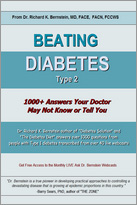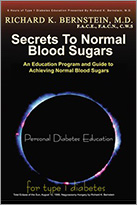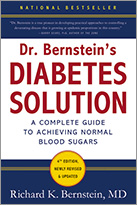by Richard K. Bernstein, M.D., F.A.C.E., F.A.C.N., C.W.S.
February 1999
Diabetes Interview
Question:
I cannot find any information on the effect of short-term spikes in blood sugar (i.e., 115 before breakfast, 170 one hour after breakfast). How dangerous are swings? Currently, I am not on any medication and I am simply trying to control my blood sugar through diet and exercise. I am not overweight (6 feet tall, 175 pounds), and I walk four miles about four to five times a week. Even with all of this, I still cannot control my blood sugar into the nondiabetic range. Any suggestions?
Dave, Internet
Answer:
Your question brings up two points. The first is whether there is a long-term hazard in pre-breakfast (i.e., fasting) blood sugars of 115 mg/dl? The American Diabetes Association (ADA) appears to have answered this when it created a new diagnostic category known as “impaired fasting blood glucose” for individuals who display fasting values greater than 110 mg/dl on two occasions.
Your second point relates to transient spikes. I see many non-diabetic obese people whom I help to lose weight. A number of these individuals have normal fasting glucose levels (about 90 mg/dl) but HbA1c values that are slightly elevated at around 5.5%. This corresponds to a four-month average blood sugar of about 120 mg/dl at my lab. I suspect that such mild elevations have been present for years. Inevitably, I’ll find some early diabetic neuropathic complications on physical examinations.
These may include (not in any order):
- somewhat diminished heart rate variation on deep breathing (parasympathetic neuropathy)
- dry skin on the feet (sympathetic neuropathy)
- the intrinsic minus foot deformity with claw toes and high arch (motor neuropathy)
- diminished sensation in the feet (sensory neuropathy)
- double vision in one or more directions of gaze (motor neuropathy)
Usually, more than one of these signs is present. I suggest that you have your HbA1c checked. Normal values are probably below the midpoint of the normal range of your laboratory, since most labs tend to set their normal ranges too wide.
For the problem of controlling your blood sugars, I would advise a low-carbohydrate diet. If you are in shape and exercise, it is likely that you might be consuming too much carbohydrate. If a low-carbohydrate diet does not normalize your blood sugars, the next step would be insulin, which must be administered in a physiologic manner as determined by blood glucose profiles. Although sulfonylurea oral medications might work initially, they are not long-term solutions.
My book, Dr. Bernstein’s Diabetes Solution, goes into great detail on all of the above.




